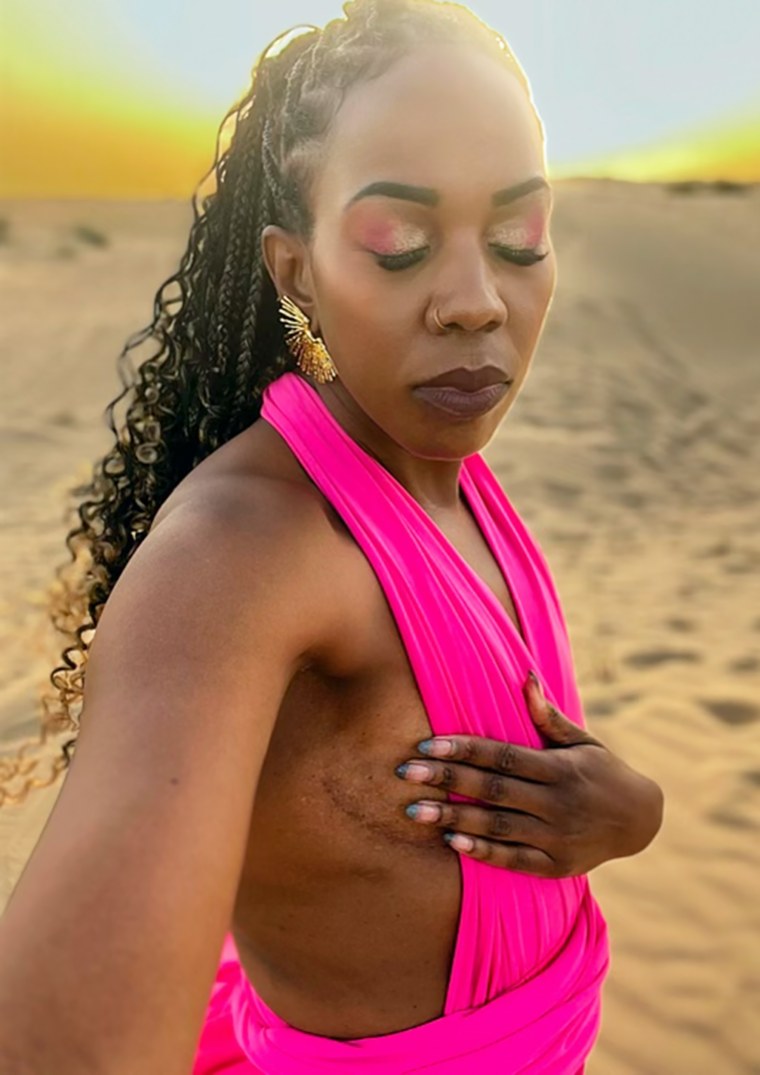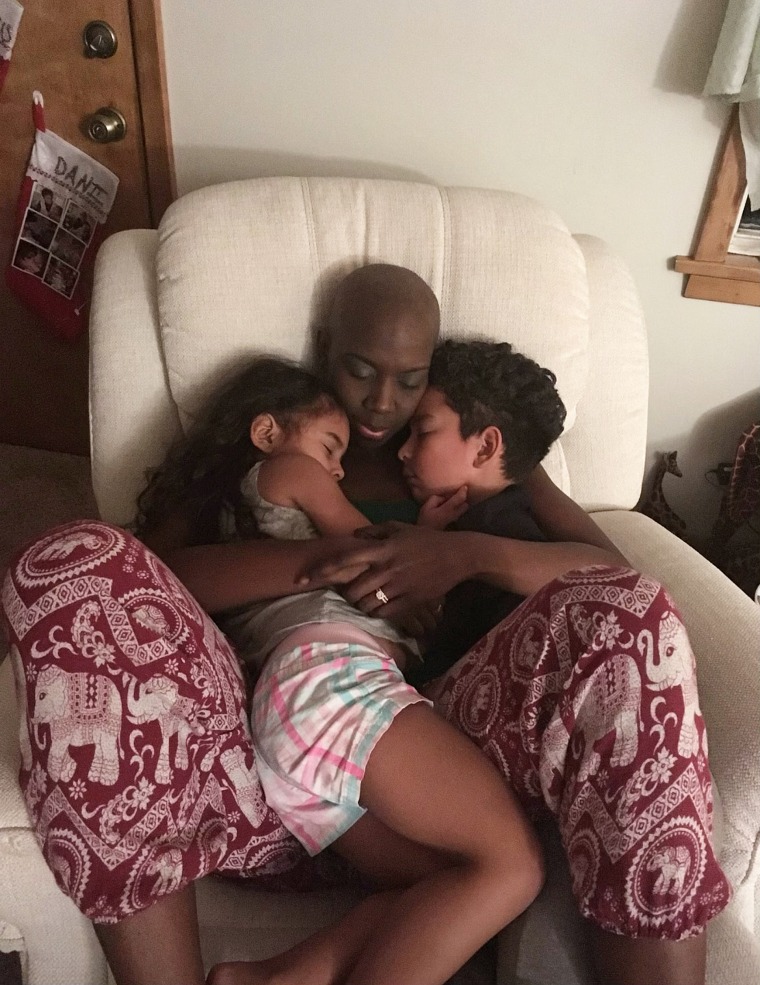As part of her treatment for stage 3 hormone positive breast cancer, Rosalina Felipe, then 28, started taking medication that put her into menopause. At first, she thought little about it because she was focused on making it through active treatment and becoming cancer-free. After treatment ended, symptoms, such as hot flashes, joint pain and brain fog, increased and she felt unsure about what these changes mean for her.
“I never felt prepared about being in menopause,” the now 31-year-old from Los Angeles tells TODAY.com. “I wanted more education on what happens when my body is in menopause.”
Last year, her annual bloodwork revealed high cholesterol, something she had never experienced before. Online she read that menopause can cause cholesterol to rise. For clarity, Felipe asked her oncologist about the long-term effects of a premature menopause.
“I was asking her about my heart health, what can happen to that? My brain health. My mind isn’t as sharp as it was before I started medication and I feel dumb,” she says. “I’m really concerned about the long term.”
Felipe won’t have to be on the medication causing menopause forever, but she doesn’t know if the symptoms she experiences now will have a lasting impact on her health. Felipe is not alone. Many women who are treated for cancer or other conditions find themselves in menopause earlier than their peers. They often feel isolated. Friends and family members are starting families and building their careers while people in premature menopause cope with night sweats, mood swings, loss of sex drive and brain fog, among other symptoms.

“I had to navigate this menopause all on my own,” Felipe says. “All of the information that I’ve saw or read was just all on my own.”
Early and premature menopause
According to the U.S. Health and Human Service's Office on Women’s Health, the average age of menopause is 52 in the United States. Early menopause occurs before age 45 and premature menopause occurs before 40, the agency says. Both early and premature menopause occur for the same reasons, including family history, smoking, chemotherapy, pelvic radiation, surgical removal of the ovaries, hysterectomies or other health conditions. While research on women’s health lags, there’s still enough evidence for experts to know that starting menopause early can contribute to health problems later.
“There’s huge huge medical repercussions,” Dr. Lauren Streicher, a certified menopause practitioner and clinical professor of obstetrics and gynecology at Northwestern University’s Feinberg School of Medicine, tells TODAY.com. “They are, in most cases, more than twice as likely to develop a long-term medical issue than someone who goes through menopause at the predictable time, particularly when we look at heart disease.”
For people who can take hormone replacement therapy, Streicher says “there’s consensus in the medical community” that they should be taking it.
“This is not controversial,” she adds. “(For premature menopause) you put them on hormone therapy, and you keep them on because they are at such high risk for medical problems.” Those who go through premature menopause are at great risk for heart disease and osteoporosis and often experienced more severe menopause symptoms, the Office of Women’s Health says.
But for those who cannot take hormones, such as people who have hormone positive breast or reproductive cancers, treating their symptoms can be tougher. But treatments exist.
“There are non-hormonal ways to treat bone loss,” Streicher says. “There are non-hormonal ways to treat hot flashes.”
Patients in perimenopause and menopause struggle to find doctors who understand how to treat their symptoms. It can feel harder for those in premature menopause. Oncologists and even OB-GYNs might not be familiar with the latest research on menopause and its treatment.
“There was an article that came out this year that looked at what kind of menopause education most OB-GYNs get during residency and it’s pathetic,” Streicher says. “It’s pretty much nothing. So, this idea that your OB-GYN is, of course, going to know something about menopause is simply not the case. Very few of them do.”
Felipe experienced this when she struggled to locate a doctor to help her with her menopause symptoms, which “really bummed (her) out.”
“It is difficult to find a provider,” she says. “I said (to my oncologist), ‘Is there a menopause specialist I can see.’ And she looked online in the directory of the hospital and she’s like, ‘No, I don’t think so.’”

Being in premature menopause can also negatively impact mental health and the Office of Women’s Health warns that many people experience depression and altered moods as they grapple with their changing bodies and loss of fertility. Asha Miller, who had stage 3 progesterone and estrogen positive breast cancer in her 30s, says that for her menopause came with some serious emotional changes.
“It’s been bouts of depression and anxiety. I feel like today I can say it’s a lot better than it has been,” the 40-year-old from Columbus tells TODAY.com. “It was something I didn’t even know if I had the words to articulate it to get the help I needed because I didn’t understand quite what was happening to me.”
Streicher says mood swings often occur in perimenopause and menopause but going through premature or early menopause exacerbates emotional changes.

“They feel like they’re some kind of freak,” Streicher says. “The truth is they are isolated … when you’re talking about premature menopause you may be the only one of your friends in it.”
‘Sweating profusely and fanning myself’
In her early 30s, Lindsey Peters began experiencing problems with her periods accompanied with pain, bloating, constipation and backaches. After about seven years, she learned she had endometriosis, a condition where tissue, like the lining of the uterus, grows outside the uterus. Her doctor at the time prescribed a shot that put her in menopause in an attempt to treat her endometriosis. For three months, Peters took the once monthly shot and developed more symptoms.
“When you have endometriosis, you’re desperate to try anything because you just want to feel better,” Peters, 45, of Arlington, Virginia, tells TODAY.com. “I was already having the painful periods, the bloating, the bleeding, the cramping. I was having that and I was having hot flashes and I’m having terrible mood swings.”
She returned to her doctor, who dismissed her.
“His response to me was, ‘Well I’m going to give you some water pills for the bloating, and I’m going to send you to see a psychiatrist,’” she recalls. “I felt hopeless and dismissed and unheard. And I almost felt silenced.”
She stopped taking the medication and eventually found a doctor who specializes in treating endometriosis who performed excision surgery to remove the lesions and scar tissue from the condition. While she felt great for about four months, her symptoms returned, and she tried a different injection that can cause menopause. At the time she was 37.

“I would be at work sweating profusely and fanning myself and then the next minute I would be freezing,” Peters says. “I would have migraines, vaginal dryness as well as different mood swings.”
Again, she stopped the medication. As her endometriosis symptoms progressed, she had a hysterectomy because of adenomyosis, a condition where tissue, like the lining of the uterus, grows into the muscle of the uterus. She now only has her right ovary. Again, the telltale signs of menopause began.
“I was having hot flashes, vaginal dryness, discomfort during sex. I was having difficulty sleeping,” Peters says. “My mood was also really low.”
While she tried hormone replacement therapy, it caused her to gain weight. Other medications used to treat symptoms caused her endometriosis symptoms to flare up again.
“Here I am going through menopause because of endometriosis,” she says. “It’s just a very complicated illness.”

In Miller's case, she noticed unexpected symptoms after being diagnosed with breast cancer and undergoing a chemotherapy regimen that includes doxorubicin, known as the red devil because of it’s bright red color.
“They don’t tell you, girl, that chemotherapy puts you into menopause,” Miller says. “That is something I wish I knew before I was diagnosed.”
Suddenly, Miller was grappling with side effects she hadn't anticipated.
“I would be soaking through my sheets and it’s the dead of winter,” she says. “There’s vaginal dryness. There’s mouth dryness. There’s sometimes a loss of sexual desire.”
Miller also was experiencing side effects of cancer treatment including weight gain, hair loss and radiation burns. After she finished treatment, she began a period again, but then started bleeding constantly and underwent a hysterectomy.
“Everything was put to sleep, and they want it to produce the least amount of estrogen possible and because of that when it tries to wake up a little bit … it can’t quite regulate back,” she says. “I just kept bleeding.”
Miller, like Felipe, belongs to a group called The Breasties, a support group for young people with breast and reproductive cancers or those at risk for them, such as those who carry the BRCA mutation (they're also called previvors). From them, Miller learned that sometimes cancer treatment leads to permanent premature menopause.
“Some of the Breasties, that I’ve at least spoke to, their period doesn’t come back (ever),” she says. “There’s a lot of different side effects of the hormones being basically put into sleep.”
Felipe shares her experiences on social media and finds that speaking up about having cancer and being in menopause empowers her.
“I have to start advocating for myself and finding other resources and ways to understand what I can do to navigate this menopause era,” she says. “I’m going to enter menopause at least for the second time when I’m older so it’s best that I try to navigate it now.”
While friends Miller made in the Breasties help her feel less alone about being in menopause prematurely, it can still be tough to be young and grapple with it.
“Your body has just been through so much trauma,” she says. “So many of those things come with menopause naturally but it’s heightened when you’re younger. It’s embarrassing to try to talk through these things because you’re like, ‘I'm not supposed to be going through this in my body yet.’”